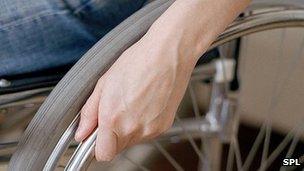Welfare Reform Bill passes final House of Lords hurdle
- Published

The government's controversial Welfare Reform Bill has passed its final hurdle in the House of Lords.
The bill introduces an annual cap on benefits and overhauls many payments within the welfare system.
David Cameron has said it marks an historic step in the biggest welfare revolution in more than 60 years.
But a report from a parliamentary committee has warned that changes to the benefits of disabled people may risk their right to independent living.
The Welfare Reform Bill, which applies to England, Scotland and Wales, had "ping-ponged" between the Commons and the Lords for several weeks.
Peers had inflicted seven defeats on the bill, including imposing a £26,000 annual benefit cap for working age households and means-testing employment and support allowance after one year.
But one by one the votes were overturned by MPs. On Wednesday crossbench peer Lord Best withdrew an amendment on the final point of dispute - the "under occupancy" penalty - dubbed a "bedroom tax" by critics - for social housing tenants in properties judged to have more rooms than they need.
'Endless cycle'
The Bill will now be sent for Royal Assent.
Work and Pensions Secretary Iain Duncan Smith said he was delighted that the bill had passed the Lords.
"Many people said it would not get through, but it has and on time," he said.
"This bill reforms every part of our welfare system and I look forward to implementing the changes our country badly needs.
"The Universal Credit will mean that work will pay for the first time, helping to lift people out of worklessness and the endless cycle of benefits."
Meanwhile, MPs have said that the rights of disabled people to lead an independent life must be written into UK law.
The Joint Committee on Human Rights said the "cumulative impact" of welfare reforms could force some people out of their homes.
The UK ratified the UN Convention on the Rights of Persons with Disabilities in 2009, but the coalition must "fulfil its obligations", the committee said.
'Hard law'
The cross-party committee's report criticised changes to benefits, including restrictions in local authority eligibility criteria for social care support and the replacement of the Disability Living Allowance with Personal Independence Payment.
It also said the closure of the Independent Living Fund and changes to housing benefit "risk interacting in a particularly harmful way for disabled people".
The report stated: "The right to independent living does not exist as a freestanding right in UK law.
"Although it is protected and promoted to some extent by a matrix of rights, the committee believes that this is not enough.
"It argues that the government and other interested parties should immediately assess the need for, and feasibility of, legislation to establish independent living as a freestanding right."
The report also insisted that the UN convention is "hard law, not soft law" and the government should "fulfil its obligations under the convention on that basis, and counter any public perception that it is soft law".
The committee's chairman, Labour MP Hywel Francis, said: "The right to independent living in UK law may need to be strengthened further, and we call on the government and other interested organisations to consider the need for a freestanding right to independent living in UK law."
A Department for Work and Pensions spokeswoman said ministers would look at the findings and respond "in due course".
She added: "The government says it will spend an extra £7.2bn on social care over the course of this Parliament."
The spokeswoman also welcomed the committee's "acknowledgement that this government is committed to removing barriers and creating opportunities for disabled people, and that the UK is a world-leader on disability rights and in relation to independent living in particular".
- Published31 October 2011
- Published24 October 2011
- Published29 June 2011
- Published15 November 2010